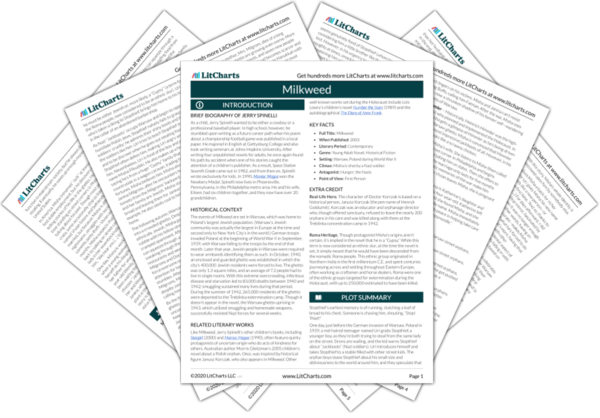Identity and Relationships
In Milkweed, which takes place in the Warsaw, Poland ghetto in World War II, a young orphan boy knows no other name than “Stopthief,” and he doesn’t remember where he comes from. As the novel develops, Stopthief’s identity develops as he meets and develops relationships with other characters—his friend Uri gives him the name Misha along with a fictional past, and he’s later unofficially adopted into a Jewish family, the Milgroms. By…
read analysis of Identity and RelationshipsWar, Dehumanization, and Innocence
In Milkweed, Spinelli doesn’t shrink from highlighting the Nazis’ brutal anti-Semitism during the regime’s occupation of Poland in World War II. There are numerous examples of characters being bullied, tortured, or killed just because they are Jewish. Misha Pilsudski is an outsider to the Jewish community, but even as a small boy, he witnesses brutality firsthand, shares in communal suffering, and shows a willingness to follow his friends even unto death. Through all this…
read analysis of War, Dehumanization, and InnocenceIngenuity, Resilience, and Survival
Misha Pilsudski, an orphan in the Warsaw ghetto during World War II, is not treated as particularly clever. Other street kids mock him for being a runt and for being clueless about the wider world. Yet Misha, who’s never known anything but life on the streets, knows how to be quick, adaptable, and observant in order to survive. As the story goes on, he learns to further develop his supposed weaknesses—especially his small size—in…
read analysis of Ingenuity, Resilience, and Survival
Family
An orphan wandering the streets of Warsaw, Misha has no memory of his family of origin. The first semblance of family that Misha knows is Uri, a teenager and fellow orphan who takes a liking to him, watches over him, and gives him a name. Misha contents himself with the made-up family history that Uri gives him, even though he knows deep down that his huge caravan of Russian “Gypsy” relatives doesn’t exist, because…
read analysis of Family






